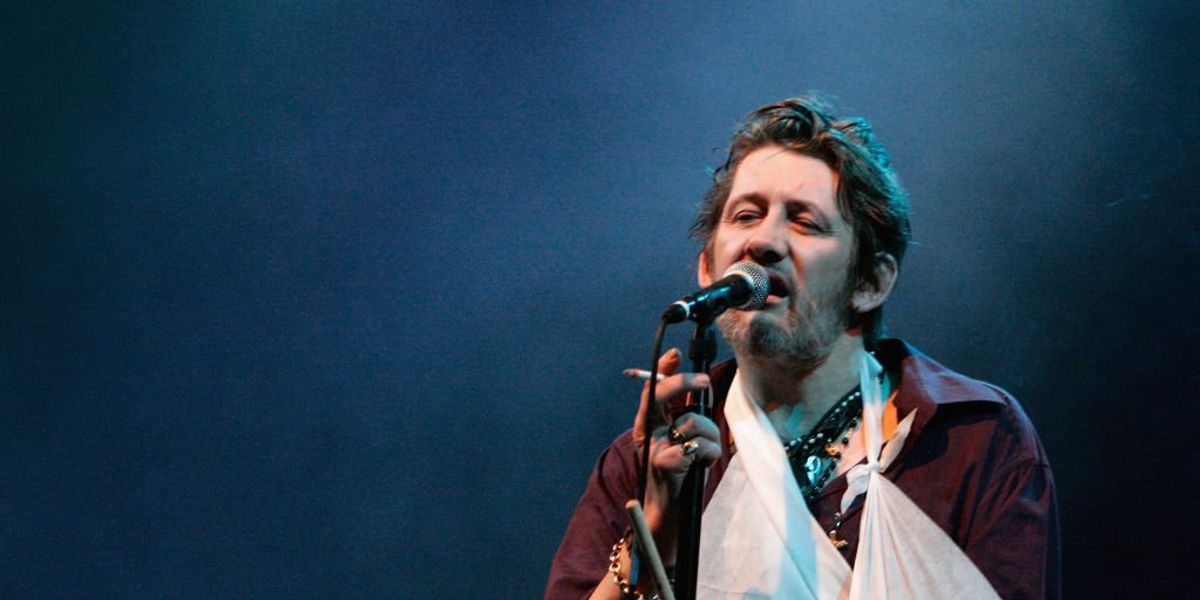The Pogues classic “Fairytale of New York” isn’t the only Christmas song to express the disillusionment and despair the season often brings — Tom Waits’ “Christmas Card from a Hooker in Minneapolis” comes to mind. Nor is the way it finds modest hope in the midst of squalor and dysfunction unique — Robert Earl Keen performs a similar trick in “Merry Christmas from the Family.” But as far as I know it’s the only Yuletide staple to do these things while gently mocking America’s cherished, sentimental notions of the “immigrant experience.”
Pogues frontman Shane MacGowan, who died yesterday at 65, portrays an Irishman living in New York City tossed into the drunk tank on Christmas Eve. Hearing his cellmate sing the Irish ballad “The Rare Old Mountain Dew” prompts him to imagine a conversation with his former girlfriend, also an immigrant, portrayed by the late English singer Kirsty MacColl. Like him, she came to America with big ambitions she never managed to realize. Their pugnacious duet is a sympathetic portrait of those who bet on a new life and lose, and yet it doesn’t entirely let them off the hook. Failure has exposed their delusions (“You promised me Broadway was waiting for me,” she complains) and viciousness (he calls her a “slut”; she calls him a “faggot.”) In the end what do they have to offer their adopted country apart from public intoxication and an additional burden on taxpayer-funded methadone clinics? You might say Ireland isn’t sending its best.
If this doesn’t offend as much as Trump’s infamous crack about Mexicans, it’s because we’ve long ago learned to think of Irish-Americans as “white.” And white people inflict racism rather than suffer from it. It takes some effort (at least for sheltered, historically illiterate Americans) to imagine a time when the Irish fled conditions just a brutal as any faced by our modern-day refugees, only to meet with discrimination just as harsh as that endured by formerly enslaved black people. Also, earlier immigrants to America — be they European or Chinese or Indian — tended to arrive with the assumption that their new home owed them nothing. At the very least this realistic attitude allowed them to conserve time and energy that would otherwise have been wasted on self-pity and resentment. Some of this is reflected in the atmosphere of cheerful resignation that keeps “Fairytale of New York”‘ from slipping into bathos.
But in Ireland some remain painfully conscious of the shame at the heart of leaving home in search of a better life. MacGowan himself was the child of immigrants: His parents were Irish, but he was born in England. It was as part of London’s flagging punk scene that he first had the inspiration to draw from Irish folk music. His distinctly irreverent approach angered many in Ireland, as did the way he seemed to perpetuate the worst stereotypes of the Irish diaspora. Even as Irish leaders celebrate MacGowan as a national treasure, misgivings about what he represents linger. Writing in the “Irish Times” three years ago, Michael O’Loughlin noted “an element of dismissiveness and distaste” whenever some of his countrymen discussed the singer, chalking it up to a kind of national repression: “MacGowan in all his flawed glory is a constant reminder of the guilt and trauma of an episode we have yet to fully confront.”
The value of the wonderful music MacGowan leaves behind is obvious. But what of this complicated legacy? Pondering it might help us see the current wave of immigrants vexing us more clearly, neither as ravenous hordes nor saintly victims but as flawed fellow humans who want the same things for themselves and their children as anybody else. With this clarity comes the necessary acknowledgment that this crisis, however we may be bungling it at the moment, is not of our making. Even the most opportunistic, benefits-seeking immigrant of conservative nightmares would be unlikely to undergo the risk and inconvenience of illegal immigration if conditions at home weren’t sufficiently dire.
Every non-native U.S. citizen, of course, owes his life here to ancestors who fled somewhere else. But the economic, social, and spiritual coherence that once allowed for the seemingly limitless assimilation of newly minted Americans is not what it once was. If we have a moral obligation to compensate for the failures of another country, surely we also have an obligation to ensure the success of our own.
